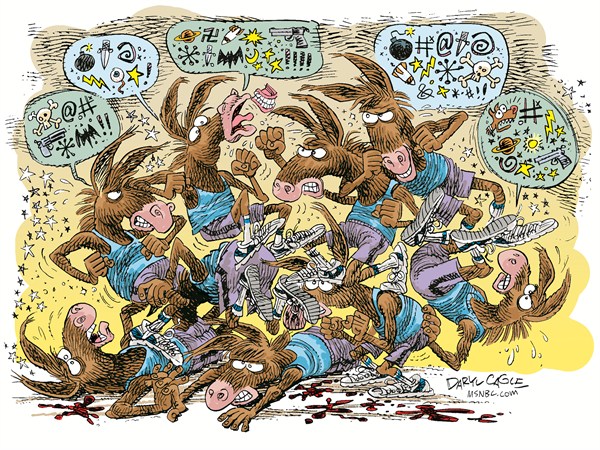
"We're going to beat him on the ground," Wilkes said last year in an interview with the Young Turks. "We're going to beat him with the power of the people."
The pandemic ripped a hole in that plan, trapping Wilkes in her home and making a door-to-door campaign impossible. "I've been in the house so long," she said in an interview, "I don't even know where my car keys are." One week before the June 2 primary, Wilkes remains an underdog; candidates like her, working to persuade Democratic voters to replace their leaders, are confronting a pandemic that has kept them off the trail - while the crisis has allowed those leaders to consolidate support.
"The pandemic has created a situation where to campaign against the incumbent, you need a story to tell about the incumbent's poor leadership during the pandemic," said Waleed Shahid, the spokesman for Justice Democrats, which is backing five challengers in upcoming primaries or runoffs. "You cannot get a single news story in this climate that is not about the pandemic. You've seen incumbent executives soaring in public opinion, because they have a megaphone to give info to their constituents. That goes a long way."
Justice Democrats, founded after the 2016 election to replace "corporate Democrats," has focused in this cycle on a few primary challenges in which incumbents look vulnerable and Republicans have little chance to win. It started the year auspiciously, with first-time candidate Jessica Cisneros falling just short of unseating Rep. Henry Cuellar, D-Texas, and activist Marie Newman unseating Rep. Daniel Lipinski, D-Ill., on her second try. What didn't exist for Sen. Bernie Sanders, I-Vt., in 2016 seemed to be building for young, liberal challengers: a broad network of donors and strategists ready to dismantle incumbents.
The coronavirus pandemic made that harder, and so has a factor that wasn't there a few years ago: widespread Democratic satisfaction with major party figures. According to public polling, including the latest Economist/YouGov tracker, a supermajority of Democratic voters are behind their nominee and top congressional leaders. In the new poll, 81% of Democratic primary voters had "very" or "somewhat" favorable views of presumptive Democratic presidential nominee Joe Biden, while 77% of Democratic primary voters had that view of House Speaker Nancy Pelosi, D-Calif.
That hasn't prevented a debate about the party and its response to the pandemic, with voices on the left accusing Democrats of passing a quick giveaway to corporate interests instead of a stimulus that would have given most people a basic income through the duration of the crisis. And liberal challengers are still expressing concerns about the party's presumptive nominee, with some candidates suggesting that Biden is not telling the truth about a former staffer who accused him of assault, a charge he has denied.
But polling has found a supermajority of Democrats taking Biden's side, more since media investigations cast doubt on Tara Reade's story. A Quinnipiac poll released last week found that 10% of Democrats believe Reade's word over Biden's. Criticism of the party and the ticket, which can be overwhelming on social media, isn't reflective of most Democrats who vote in primaries. (In an interview with The Washington Post, Wilkes said Reade's "claims were legitimate" and that it was also "legitimate to look into her claims.")
The funding for primary challenges has not dried up. According to her last pre-primary FEC filing, Wilkes raised bit less than $90,000 from April 1 to May 13, more than the $81,000 she'd raised from the start of January through the end of March. Hoyer, by contrast, raised less than $38,000 in the final filing period, when the campaign canceled a fundraising picnic, down from $520,000 in the first three months of 2020. The small-donor model that has powered her primary challenge resisted the first months of the pandemic better than Hoyer's local or high-dollar donors.
It has been tougher to convince voters that Democrats, as they're currently being led, are doing so poorly that they must be replaced. In New York's 16th District, where school principal Jamal Bowman is challenging Rep. Eliot Engel, he's broken through not with any particular criticism of Engel's votes but with a story about Engel remaining in his Washington-area home during the pandemic. In her own district, Pelosi has benefited from frequent fights with the president, overwhelming intraparty criticism of how she has approached the pandemic.
"She demonstrates the failure of the corporate, institutional Democratic Party every day," said Shahid Buttar, who is facing Pelosi in the November runoff. "If we see polling bumps for Democratic incumbents at the moment, I think that's driven by the false impression that they're emphasizing public assistance. The reality is that they're emphasizing bailouts for lobbyists before rent and mortgage relief."
In Maryland, Wilkes has no shortage of arguments against Hoyer. She endorses the Green New Deal and Medicare-for-all; he doesn't. She would have required full funding for the post office and vote by mail in any stimulus plan; he didn't.
Hoyer's campaign pointed to his work on battling the coronavirus, saying he has "been in constant contact with community leaders, small-business owners, 5th District public health officers, local faith leaders, and his local, state, and federal colleagues."
Although some voters were nervous about throwing out a key party leader in a crisis, Wilkes said, the campaign could deal with it.
"I have heard that, but not too frequently," Wilkes said. "You know, a majority of people who come in contact with our campaign are eager for change. And a lot of people understand the urgency of this moment. Even folks who were very, very strong Hoyer supporters are, at this moment, looking for something other than just the normalcy of voting for whoever's been there for years."
(COMMENT, BELOW)


 Contact The Editor
Contact The Editor
 Articles By This Author
Articles By This Author